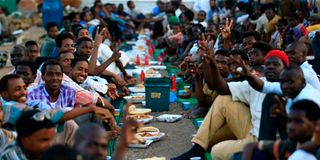Ramadhan traditions in Sudan fade away amid Covid-19 pressures

Sudanese protesters gather to break their fast outside the army headquarters in Khartoum on May 7, 2019, on the second day of the holy Muslim month of Ramadhan.
Khartoum,
Despite a long-time observance of Ramadhan traditions as a social legacy, the Sudanese people this year have to abandon some of them in the throes of economic pressures, Covid-19 precautions and social transformations.
In the capital Khartoum, the streets are almost empty of collective iftar, the evening meal marking the end of daily fast during the holy month of Ramadhan.
"Until recently, Ramadhan was an occasion for social solidarity and family interconnections," Imtisal Al-Tayeb, a Sudanese social researcher, told Xinhua on Saturday.
"However this year, those social manifestations have almost faded away because of the economic conditions and the high prices, with fewer people gathering outside for the collective iftar of Ramadhan," she said.
Fear of the spread of Covid-19 is another factor in a depressed Ramadhan as people are committed to health precautions including social distancing, Al-Tayeb added.
The social researcher referred to social transformations as the third contributor to the decline of the Ramdan-related traditions in Sudan.
"The popular connection in Khartoum is diminishing little by little due to continued immigration and lack of communication among the population," she explained.
No activities
The Ramadhan tradition of El Mesaharaty, a name given to people who walk around and beat drums to wake others up for suhoor, the meal eaten early morning before beginning the fast, has also witnessed a marked decline this year.
"This year we do not have any activities. The reason is the ban of gathering due to coronavirus," Abdul-Azim Noureddine, a member of a suhoor group of young men in southern Khartoum's Al Azhary neighborhood, told Xinhua.
"There is also some security disorder in Khartoum, forcing some of our group members to avoid gathering," he added.
It is worth noting that Hulu-murr, a traditional Sudanese soft drink essential on the fast-breaking table during the holy month in Sudan, seems to have been affected by the high prices.
"This year we were forced to abandon Hulu-murr, which has become very expensive, "Umal-Kiram Yaqoub, a housewife of southern Khartoum's Suba neighborhood, told Xinhua.
The total cost of the needed sorghum and other ingredients to make Hulu-murr is about 5,000 Sudanese pounds (13 U.S. dollars), which is a very large amount for a normal family, Yaqoub said.
"We have lost the taste of Ramadhan after losing the taste of Hulu-murr," the housewife added.





